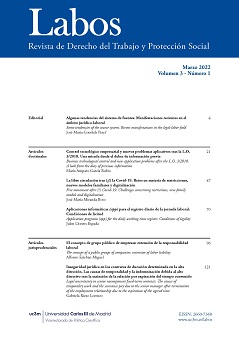Application programs (app) for the daily working time register. Conditions of legality
Abstract
This article analyses the legal feasibility of applications for compliance with the mandatory registration of the daily working time register of art. 34.9 ET, placing the object of study eminently in workers who provide services in a remote mode. The study uses the guidelines issued by the Spanish Data Protection Agency and other public institutions to analyze the challenges and possible legal breaches that computer applications can generate on the rights and freedoms of workers, while weighting with the opportunities and benefits that are generated with it for all the parties involved. All this is done with the support of the specific jurisprudence on the matter and a look at the level of assumption of this remote registration modality by the social agents.
Downloads
Copyright (c) 2022 LABOS Revista de Derecho del Trabajo y Protección Social

This work is licensed under a Creative Commons Attribution-NonCommercial-NoDerivatives 4.0 International License.
Loa autores ceden a la Revista Labos los derechos de reproducción y distribución, así como cualquier forma de explotación del trabajo.




